The New Ethics of Driving in the Time of COVID-19
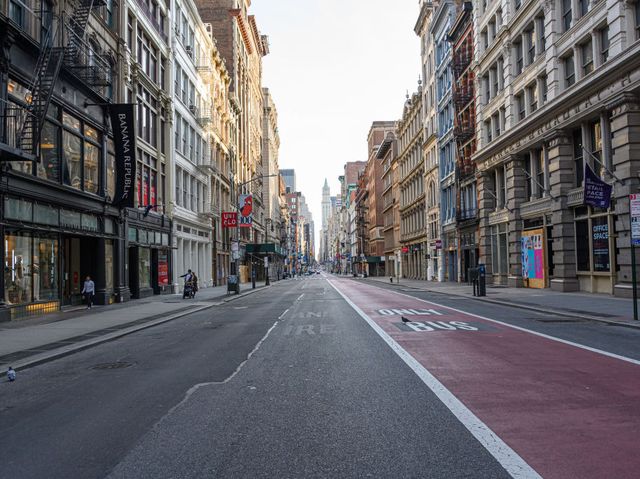
NOAM GALAIGETTY IMAGES
Does taking the long way home mean we’re being selfish, stupid and irresponsible?
When I drove through a deserted Manhattan last week in a Ram Rebel 4x4 EcoDiesel—a serious choice for post-apocalyptic touring—the only thing missing was tumbleweeds on Broadway. COVID-19, or its specter, was riding shotgun while I pinched the steering wheel and pictured hazmat-suited press-fleet workers disinfecting that leather grip so I might live to write about a pickup truck. Then I ate a homemade prosciutto sandwich, wiped my chin (sorry, Dr. Fauci), and the guilt kicked in. While New Yorkers and most Americans were being ordered to stay indoors, I was playing hooky from the virus’ home-schooling, cleansing lungs and spirit with a hike on the Appalachian Trail near Cold Spring, New York.
I’d already been scolded by a friend, under virtual martial-law quarantine in Puerto Rico—including alternate-day driving based on license plate numbers—for taking unnecessary risks. (She also dreamed of outdoor freedom, a road trip among Oregon’s redwoods.) The Centers for Disease Control, or AAA, might say the same. But does a joy ride or supermarket detour automatically mean we’re being selfish, stupid and irresponsible? As unnerved Americans struggle to make sense of often-conflicting advice and proscriptions, while trying to do the right thing, what are the ethics of driving during coronavirus?
It’s an apt question for enthusiasts, for whom driving is more than economic necessity. To us, driving is as natural as breathing. Only now, breathing itself is unnatural, so we hold our breath as fellow humans pass on the sidewalk. We feel ridiculous, but it seems as good a practice as any. The best defense is to shelter-in-place, as 316 million Americans have now been instructed. But with 276 million cars registered in the nation, nearly one for each of those cabin-fevered folks, something’s got to give, as evidenced by the many cars joining me on the Palisades Parkway along the Hudson River. For pleasure drivers, the temptation is obvious: In cities throughout America, normally clogged roads look like Porsche playgrounds, average speeds have soared and police are treading lightly, pulling over only egregious offenders to limit contact.
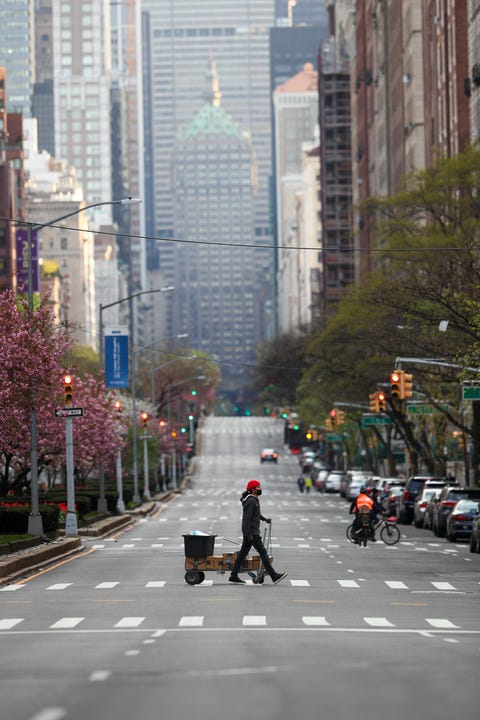
ANADOLU AGENCY - GETTY IMAGES
Morally torn, I began asking for advice. Some parents, despite juggling schoolwork and antsy offspring, said they weren’t letting children drive unless necessary. Ken Morris, General Motors vice president for electric and autonomous vehicles, has two teenage drivers at home in Michigan, including a 15-year-old with a fresh learner’s permit.
“They’re dying to get out, but we’ve agreed we won’t let them just drive around,” Morris tells Autoweek. “It’s great for them to get the experience and the miles, but if something goes wrong, they’re using the resources of police or EMTs that could be needed elsewhere.”
Both Kerouac and the Constitution cite the freedom of the open road, the latter affirming a “right of travel.” But legal experts said states have wide latitude in restricting driving during a pandemic or other crisis. To the ACLU’s dismay, so they have. Several states have set up roadway checkpoints to monitor or restrict the influx of nonresidents and ensure they self-quarantine. The Florida Keys has barred entry to people who don’t live, own property or work there. Utah Gov. Gary Herbert issued an order requiring drivers who enter the state in a vehicle to complete a travel declaration form. In New York, a State Police spokesperson underlined that, despite rampant rumors—and apparently a rogue actor impersonating an officer to pull people over and “warn” them of a travel ban—there are no legally binding driving restrictions, closed roads or checkpoints.
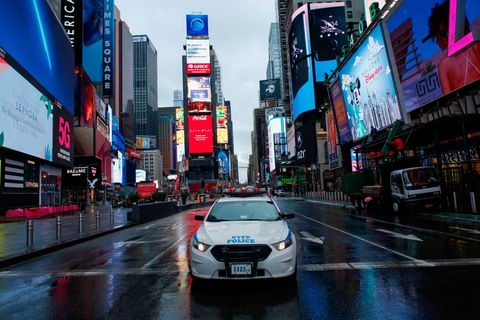
Amid rumors, officers are not pulling people over to confirm essential travel. -- KENA BETANCURGETTY IMAGES
“The state is encouraging people to stay home and refrain from unnecessary travel, but it has not enacted any type of travel ban,” the spokesperson said. “There have been rumors that State Troopers are stopping motorists and checking if they are authorized to travel, but that is not the case.”
So in New York and most other places, driving is on our individual consciences. Staying locked down is obviously for our own good, to flatten curves like a Tesla Cybertruck. Now, whose conscience should be clear?
Plenty of work-related driving is “essential” by logic and law. Some essential occupations might not make your first cut, from liquor store cashiers to auto-parts store workers, shampoo (and yes, toilet paper) makers or plumbers. But when your delivery truck breaks down or your toilet overflows, you get it. Definitions are stretched like a blunt in California, where cannabis-industry employees are considered essential. (I’d make a joke here, but that’s just a low-hanging bud.)
There are easy calls: Driving your car to deliver heart medicine to your aging mother isn’t just the ethical choice, but the karmic one. Other COVID cruising has been indefensible or reprehensible, like taking advantage of empty Manhattan streets, getting wasted and wrecking a Gemballa GT or seeing this plague of death and economic misery as the perfect opportunity to set a Cannonball Run “record.” Claim your trophy, boys, as America’s new Douchebags of Driving.
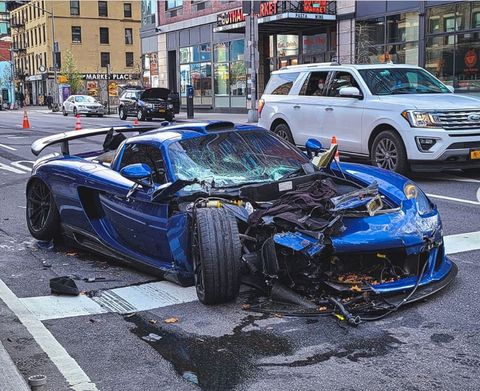
RONNIECNYC/INSTAGRAM
In between, there are several lanes of gray. How about that innocent solo drive to the woods, or an escape to a vacation cottage, with only your conscience and a tankful of $1.89-a-gallon unleaded? Essential, no. Defensible?
For that, I contacted Randy Cohen. For 12 years Cohen wrote The Ethicist advice column for The New York Times Magazine. He’s collected four Emmys for writing on the Late Show with David Letterman and Michael Moore’s TV Nation. I could use a laugh right now, but this was serious.
From a legal standpoint, I knew my Ram day-trip passed muster. Besides there being no driving ban, I work in media; defined as a “critical infrastructure worker” whether we’re covering breaking news or complaining we can’t get our hair or nails done during the outbreak. As for ethics, I explained to Cohen I had been driving a 3-ton isolation chamber, gave wide berth to two people I encountered on the lonely AT and drove straight home. I mentioned a World War II propaganda poster during the era of fuel rationing proclaiming “When you Ride Alone, You Ride with Hitler!” Cohen mulled it all over.
“I don’t see how you harmed anyone,” Cohen said, finally. “There are no fuel shortages; social distancing is the issue here. And this metal box you’re in, it’s presumably sanitized.”
Our automobiles, Cohen suggested, and the sprawling and social distancing they promote, are surely one reason Los Angelenos are holding up better than subway-stuffed New Yorkers during the pandemic. Cohen noted that Dr. Fauci, an avid runner, and other experts have urged people to get outdoors for their physical and mental health, while staying near home.
I was also not fully buying that driving per se risks overburdening EMTs or hospital personnel, and Cohen agreed. One might just as well fall off a ladder while performing that long-delayed home project, or slice a finger while attempting beef bourguignon, and end up in the same ambulance and emergency room as a driver. Should we stop wielding kitchen implements as well?
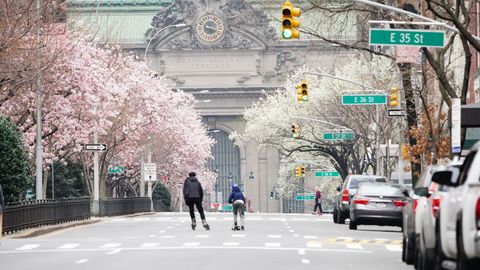
NURPHOTO - GETTY IMAGES
Then Cohen decided to go all deep, damn him. In some quarters, an indifferent, denialist response to COVID-19 has been eerily similar to that of climate change. The cars we drive are heavily implicated in the latter crisis—and the attendant rise of vector-borne viral threats, if not COVID itself. (Sweating, yet?) Yet even as the pandemic rages, Cohen notes, the Trump administration has found time to gut standards for fuel economy and toxic power-plant emissions. Finally, car crashes kill about 1.35 million people a year, barely meriting mention on the news. Some previous crises, including the ’70s oil shocks, galvanized America to do better by people and the environment. Around the world, officials and planners are seeing this temporary “paradise” of flowing roads and navigable cities and seeing inspiration for the future. Cohen argues that, for drivers, the most ethical choice of all will be to connect all those dots when the crisis is over.
“Horrible crises can be a moment of opportunity,” Cohen said. “We’ve been forced to see other ways of living,” including dramatically cleaner air over major cities around the world.
Finally, Cohen agreed even sheltering at home doesn’t let us fully off the ethical hook. We’re letting unheralded folks on the front lines do our dirty work for us, from the pizza delivery dude to the Amazon workers who threatened to strike over safety conditions.
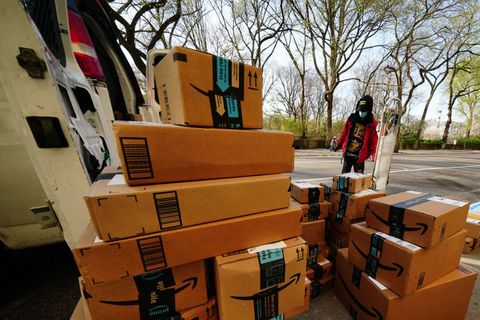
NURPHOTO - GETTY IMAGES
“I haven’t been in a store in three weeks, and I’m mindful that the person doing that is putting himself or herself at risk,” Cohen said.
I thought of the UPS man who surprised me, on a Sunday, with a J. Crew delivery. Whatever that guy was getting paid, it wasn’t enough. Entire swaths of professional drivers and transportation workers might unknowingly carry the virus, or passengers or customers might infect them. But in a global crisis like this one, Cohen said, viewing those individuals and their choices through a narrow ethical lens doesn’t bring clarity.
“If that Uber driver might be infecting other people, is it ethical for him to be driving? The answer is ‘no,’ but ethics don’t require him to starve, either,” Cohen said. “He needs money to live on and health insurance, or he’s going to drive, and it’s hard to tell him not to.
“Human beings are social creatures, not atomized individuals, and that’s why our biggest ethical solutions have to be community-based.”
That interconnectedness and intimacy defines the crisis, but it also makes solutions so maddeningly difficult. Every one-to-one social or business handshake, every tollbooth, gas-station fill-up, shared appetizer or shaken cocktail is our life and economy in microcosm. The poisoned threads wanting to kill us also hold the key to a cure. Somehow, without needlessly jeopardizing ourselves and each other, the world needs to put those strands back together so we can get back to work, catch a movie, throw a goddamn victory parade—and hit the road again. One thing is certain: Those first road trips are going to be epic.
SOURCE: Autoweek